I have been featuring fantastic female fantasy authors (see disclaimer) but this has morphed into interesting people in the speculative fiction world. Today I’ve invited the talented and amazingly busy female fantasy author Karen Brooks to drop by.
Watch out for the give-away question at the end of the interview.
 Q: Your first book published was It’s Time, Cassandra Klein, followed by The Gaze of the Gorgon, The Book of Night and Kurs of Atlantis . The first book came out in 2001 and the most recent in this series in 2004. You were dealing with quite adult themes and you aged your main character from 13 – 16 in the course of the books. Did you publishers have any reservations about the themes or the aging of your character?
Q: Your first book published was It’s Time, Cassandra Klein, followed by The Gaze of the Gorgon, The Book of Night and Kurs of Atlantis . The first book came out in 2001 and the most recent in this series in 2004. You were dealing with quite adult themes and you aged your main character from 13 – 16 in the course of the books. Did you publishers have any reservations about the themes or the aging of your character?
 My publishers, Lothian, were really very supportive about both the ageing of the characters (the other lead character, Simon, ages from almost 15-18) and the quite adult themes. Using Greek and Roman myths (and some from other cultures as well), it’s inevitable that you strike quite complex notions and characters (the gods themselves, many of whom feature in the books, as well as a variety of heroes, were feisty, flawed and while often narcissistic, also underwent their own trials and lessons which mirror those of my protagonists), never mind the fact that the series itself dealt with a range of issues such as loss, grief, the Holocaust, and mental illness, as well as the usual suspects such as sibling rivalry, loyalty, bravery, and self-discovery. Fortunately, the readership – which was both young adult and adult – didn’t have any reservations about the themes or ageing either!
My publishers, Lothian, were really very supportive about both the ageing of the characters (the other lead character, Simon, ages from almost 15-18) and the quite adult themes. Using Greek and Roman myths (and some from other cultures as well), it’s inevitable that you strike quite complex notions and characters (the gods themselves, many of whom feature in the books, as well as a variety of heroes, were feisty, flawed and while often narcissistic, also underwent their own trials and lessons which mirror those of my protagonists), never mind the fact that the series itself dealt with a range of issues such as loss, grief, the Holocaust, and mental illness, as well as the usual suspects such as sibling rivalry, loyalty, bravery, and self-discovery. Fortunately, the readership – which was both young adult and adult – didn’t have any reservations about the themes or ageing either!
Q: The main character of this series (Cassandra Klein) is thirteen when the first book opens. Did you choose to write at the upper end of primary/lower age end of YA for a specific reason? Also, these books are written under Karen R Brooks. Did you do this to differentiate your adult fiction (Do you write adult fiction?) and non-fiction books from children’s books and what does the R stand for? (Ruby, Rosemary, Regina?)
 I did write for the upper end – not only did I age Caz Klein from 13 to almost 16 across the four books, but many of the themes and the Greek and Roman myths I retold (through her adventures) were quite adult and confronting. I also dealt with themes of loss, mental illness and grief among many others, so it was appropriate to have an older YA protagonist and target the same demographic. The books seemed to fit comfortably in that age range and many adults read them too – which was lovely.
I did write for the upper end – not only did I age Caz Klein from 13 to almost 16 across the four books, but many of the themes and the Greek and Roman myths I retold (through her adventures) were quite adult and confronting. I also dealt with themes of loss, mental illness and grief among many others, so it was appropriate to have an older YA protagonist and target the same demographic. The books seemed to fit comfortably in that age range and many adults read them too – which was lovely.
The R in Karen R Brooks was to differentiate my adult writings from YA and also my academic work from fiction (though I now write adult fiction as Karen Brooks). It stands for Ruth and the name has a long history in my family. For as far back as we can trace ourselves (we are Mendelssohns from Germany), the eldest daughter was either called or given as her middle name, Ruth. My great-grandmother (who died in a Concentration camp) was Elsa Ruth Mendelssohn, my grandmother, Eva Ruth, mother Edna Ruth, then there’s me, and my daughter who is Caragh Louise Ruth. I used to not like Ruth – hence Caragh has two middle names, but now I love it – the history it evokes, the sense of a female line.
Q: I think we were at one of the Voices on the Coast festivals a few years ago when you were telling me about your plans for what became The Curse of the Bond Riders trilogy – a fantasy world that takes its inspiration from renaissance Venice full of magic, betrayal and mystery. Sounds fascinating. Now all three books are out, Tallow, Votive and Illumination. I understand you did a lot of research on Venice and lived in Europe for a while, travelling to Venice. (There are some lovely photos on Karen’s website which include photos from the European trip). Which comes first for you, the high concept then the research? Or does your general research on life prompt the high concept?
 Wow – great question! And I do remember telling you about the trilogy and you were so encouraging! Thank you!
Wow – great question! And I do remember telling you about the trilogy and you were so encouraging! Thank you!
The high concept came first – it always does now I come to think of it! In this instance, I had the idea for a candle-maker who basically produces these marvellous scented candles. The power of our olfactory senses are such (they are our oldest memories – our sense of smell), that when the scents infused into Tallow’s (my protagonist) candles are inhaled, people can be made to do all sorts of things – good and bad – be generous, fall in love, sign a contract, murder…. The idea for an assassin who uses candles and later becomes a celebrated courtesan was born and from that, the place and time became evident. Candles were an essential item in the Renaissance – any time pre-electricity really J – but when I started to read about Venice (I have always been mad on Italy, but didn’t know much about Venice), the novels simply had to be set there – for me, it was a natural fit. I set about learning everything I could. I wrote Tallow without ever having been to Italy let alone Venice. But before Votive (the second book) was finished, I’d been to Venice twice (I had the privilege of living and teaching in The Netherlands for a few months, so was able to “duck” over! The beauty of Europe from the perspective of an Australian – the proximity of countries and thus different cultures and cuisines to each other!), I also studied the Italian language for two years.
Q: You have a doctorate in Humanities specialising in Social Media. You lecture at UNI in ‘… the areas of media, youth, sexuality and popular culture using a psychoanalytical model’, and travelled to Beijing (China) as the first Australian Writer in Residence at the Western Academy in 2005. In 2007 and again in 2009 you spent six weeks at Teiko University (Netherlands) where you taught. You are called on as an expert to comment on Channel 7’s Sunrise and Today/tonight. (For a list of some of Karen’s articles see here). You’ve appeared on 60 minutes and on The Einstein Factor as part of the ‘Brains Trust’. With all this study and commentary are you tempted to write near future SF? We are currently living in ‘interesting times’ as the Chinese curse goes. Where can you see Australian/first world society going in the next ten years?
 I am tempted to write sci-fi! LOL! In fact, a novel I started many years ago now (but never finished – maybe one day…) was called The Cairn Experiment and was set about three-four hundred years in the future where society has reverted to very Victorian ideals about gender and sex roles especially. Women are again oppressed and while they can operate in public space and be employed, it is always in subservient roles, as assistants etc. Men too are imprisoned by the expectations of their sex. The story follows one female who’s the assistant of a rather prudish, brutish scientist and his team, sent to a place that they only recently discovered on an old map, which is called “Cairn Island” (the “Pitt” part has been erased through age). What they find on this unchartered island is set to tear society apart.
I am tempted to write sci-fi! LOL! In fact, a novel I started many years ago now (but never finished – maybe one day…) was called The Cairn Experiment and was set about three-four hundred years in the future where society has reverted to very Victorian ideals about gender and sex roles especially. Women are again oppressed and while they can operate in public space and be employed, it is always in subservient roles, as assistants etc. Men too are imprisoned by the expectations of their sex. The story follows one female who’s the assistant of a rather prudish, brutish scientist and his team, sent to a place that they only recently discovered on an old map, which is called “Cairn Island” (the “Pitt” part has been erased through age). What they find on this unchartered island is set to tear society apart.
Maybe, one-day, I’ll return to it. But I think what I am describing in that novel summarises my fears… that somehow, while we’re advancing in so many wonderful ways – science, technology, medicine – in terms of sex, gender and even the arts, there is a sense of marking time or, worse, retreating, as if we’re afraid of what we’re capable of as men, women, children. The apparent rise of a very vocal and conservative right is indicative of this and the power they have to sway political decisions and policy is alarming – and not just in first world countries either. There is also a reversion to a preference for clichéd behaviour and thoughts over originality; stereotypes masquerading as individuality and the rise of the “it’s all about me” phenomena, whether it be the narcissist unable to hold down a relationship, girls insisting on being treated like princesses and boys silly enough to attempt to do that, worrying about what “I” can get out of something instead of working towards a mutual goal… the preparedness to pepper conversations with personal pronouns…. I also worry about the notion that “fame” in and of itself (without accompanying hard work or experience) has become a desirable destination for some people, regardless of the cost; the need to be noticed. I despair that feminism is the new “f” word, that young men and women are viewed by corporations and others as consumers more than they are people and… I better stop Jsounds so pessimistic! But, I also have great hope for the future as well. We are, despite reports to the contrary and even my above observations, kinder towards each other than in the past, crime has dropped, we are able to travel and thus broaden our minds, and we’re able to debate ideas and concepts freely – at least here in Australia…. We are also critical consumers of everything, really. I just wish we’d do more of all of that. I wish we’d tolerate or at least respect difference and not be so fearful of it (I am thinking very much of gay marriage and refugees, but there are so many other issues at stake with people at the heart – I think we forget that, our humanity sometimes). Also, young people are more engaged with the world, each other and socially conscious – aware of social justice – than any generation previously. I meet some utterly fabulous young people and older ones too and, though I can despair, these people collectively give me great hope for the future.
 Q: In your book Consuming Innocence you cover ‘… the complex relationship parents, teachers and children have with popular culture – that is, advertising, sexiness, TV, computers, films, mobile phones and fashion.’ This was published in 2008 so I’m assuming it was written in 2006- 2007. Twitter didn’t exist then and not everyone was blogging, madly revealing their private fears and foibles to the world. Have you been approached to update the book for a new edition?
Q: In your book Consuming Innocence you cover ‘… the complex relationship parents, teachers and children have with popular culture – that is, advertising, sexiness, TV, computers, films, mobile phones and fashion.’ This was published in 2008 so I’m assuming it was written in 2006- 2007. Twitter didn’t exist then and not everyone was blogging, madly revealing their private fears and foibles to the world. Have you been approached to update the book for a new edition?
Simple answer – no. Everything in the book except the technology chapter (which was out of date the moment it was written for all the astute reasons you point out above) is still relevant today. Saying that, I could easily update it and include new research. I try to stay on top of things but there is so much out there. I worry it becomes like white noise. That’s why it is important to filter and distil it down to its significant essence, which is what my book tries to do.
Q: I found out Sara Douglass was ill about three weeks before she died, when I approached her for an interview for this blog. Unfortunately, the interview was more than she could manage and I was very sorry to have missed the opportunity. Sara and I had met several times over the last ten years. But you were a close friend and wrote a lovely piece, ‘Sara Douglass Remembered’ on the Voyager blog, and you gave Sara’s acceptance speech for the Norma K Hemming Award. Recently, my husband and I were trying to trace an old friend and finally ran him down via the web only to discover he’d died a couple of years ago of aids. Because of the web, people have a web-ghost who lives on after them in profiles, interviews etc, where friends and those who have just discovered their work (if they are creatives) can go and discuss their books and their lives. Have you written about the roll-on effects of web-ghosts in your field of Media Studies?
No. But I should. Before Sara died, I thought it a bit macabre to upload messages to a dead person’s site – especially from those who don’t know the person. It happens often when there’s a tragedy – a young person dying, a soldier in Afghanistan – so many people feel compelled to write something or give flowers or express their grief for someone who’s ostensibly a stranger. I understood their family and friends needing to reach out, express themselves, their pain, but not those who bore no relationship to them. I have subsequently, since Sara died, changed my mind. I have found her FaceBook page oddly reassuring, a comfort – it’s a “living” cyber-memorial even though she has died – not just for myself, but for all those whose lives she touched in some way. I have administrative control over Sara’s FaceBook page (something she granted me while still alive). When she died, I first wanted nothing to do with it (it was too painful). I posted news of her death and some updates, but had to walk away. But now, I find great comfort and delight, not only in reading posts from her fans and friends as they interact about her, her books and the joy her stories have brought and still bring, but relish her lingering presence as well. I wonder if others who have lost someone close feel the same way? But yes, by trawling through the old updates and interviews etc you do manage to get a strong sense of the person and they live on in digital form. Now I am grateful for that.
I love the idea of web-ghosts, Rowena! Thank you. And I will definitely write about it.
 Q: Following on from that, I’m fascinated by creativity, where it comes from, the function it serves society. In an article on New Scientist I read that people who considered themselves creative, whether they were sewing, gardening or writing/composing/painting, the same areas of their brains light up when doing these activities. As someone who is both creative and an academic, what is your take on creativity?
Q: Following on from that, I’m fascinated by creativity, where it comes from, the function it serves society. In an article on New Scientist I read that people who considered themselves creative, whether they were sewing, gardening or writing/composing/painting, the same areas of their brains light up when doing these activities. As someone who is both creative and an academic, what is your take on creativity?
I find that creativity can take all forms. For me, being academic – whether it’s researching an article or paper for a conference or for publication in a journal is creative as well. So often, “creative” is simply regarded as something that can only happen within the broad realm of the “arts” – with fiction writers, artists, musicians, gardeners etc. yet, creativity is much broader than that and makes an enormous contribution to society. Architects, scientists, historians, technologians, mathematicians, they’re all equally creative. If they weren’t, we wouldn’t have half the amazing inventions and ideas that we do – Steve Jobs, Bill Gates, just like Steven Spielberg, Dr Ian Fraser, or JK Rowling, are incredibly creative and innovative.
I do approach writing fiction and non-fiction differently in that I labour over the language more with fiction, with making sure the words are just right (the options are much greater). With academic jargon, academic writing, because you are contributing to knowledge culture and joining an ongoing dialogue with ideas that can be tested and often proven, you have to be precise, so it limits your choices, and it doesn’t do you any favours to be ambiguous whereas in fiction, you can be playful and work double and more meanings into your prose.
Q: In your 2012 Snapshot Interview you say ‘… I am working on two adult novels: one a contemporary and historical fantasy (it shifts time and place) that involves witchcraft, but not as we think we know it (and yes, it is thoroughly researched 
 Ahhhh… I don’t know, Rowena. I have shelved the witchcraft one for the moment and am working on the other and loving it. I am only a short way into it and am not going to rush it, but I do hope to have it finished by the end of the year. Will it see the publishing light of day? I certainly hope so.
Ahhhh… I don’t know, Rowena. I have shelved the witchcraft one for the moment and am working on the other and loving it. I am only a short way into it and am not going to rush it, but I do hope to have it finished by the end of the year. Will it see the publishing light of day? I certainly hope so.
Q: I was prompted to start this series of interviews because there seems to be a perception in the US and the UK that fantasy is a bit of a boy’s club. Do you think there’s a difference in the way males and females write fantasy?
Wow – what a powerful and potentially divisive question – this could get me into trouble! I was discussing this with another writer the other day in regards to George R R Martin. She felt that he was very masculine in his style and that it was distinctive from, say, yours, mine or hers or someone like Anne McCaffrey’s. Certainly, Martin is attracting a great deal of attention with the magnificent HBO TV series based on his series, and I do love his written work – a big fan – but is his style different because he’s a man? Maybe? Does it make it better? Worse? Neither – that’s nothing to do with sex, but about the quality of the writing and story. If there is a difference between the way men and women write (and I would suggest there has to be at least a small one – eg. a woman writer can get in a woman’s head better and vice-a-versa – not that we can’t get inside the mind of the opposite sex, it’s just the same sex can do it more accurately more often.  This might lead to male writers featuring main characters that are men and women writers, females more often, but, of course, the opposite happens and very well too), then it might be to do with point of view – the predominant one. But I don’t think the differences are as big as some might like to find. I am re-reading Sara Douglass at the moment and I feel she writes in a very direct, assertive way that drags you straight into the action and shocks you but also has such emotional depth. Like Martin, she doesn’t hesitate to sacrifice character for the sake of the story but he also manages to manipulate your emotions and make you care deeply. I have read other female and male fantasy writers who, from my perspective, do the same thing. They do the most wonderful job of crafting character and place – their work simply oozes personality and verisimilitude and you long to lose yourself in that space over and over. Juliet Marilliier, Jacqueline Carey, Kim Wilkins, Cory Daniells, JK Rowling, and many more, have this uncanny knack of creating simply wonderful worlds that leave you breathless and pluck at your emotions but they can also do epic or dark, or brutal too. But then, I have found the same with some male writers – examples off the top of my head are Hugh Howey, CS Lewis, Terry Brooks, Ian Irvine, Richard Harland, Antony Eaton, (no relation) and so many more.
This might lead to male writers featuring main characters that are men and women writers, females more often, but, of course, the opposite happens and very well too), then it might be to do with point of view – the predominant one. But I don’t think the differences are as big as some might like to find. I am re-reading Sara Douglass at the moment and I feel she writes in a very direct, assertive way that drags you straight into the action and shocks you but also has such emotional depth. Like Martin, she doesn’t hesitate to sacrifice character for the sake of the story but he also manages to manipulate your emotions and make you care deeply. I have read other female and male fantasy writers who, from my perspective, do the same thing. They do the most wonderful job of crafting character and place – their work simply oozes personality and verisimilitude and you long to lose yourself in that space over and over. Juliet Marilliier, Jacqueline Carey, Kim Wilkins, Cory Daniells, JK Rowling, and many more, have this uncanny knack of creating simply wonderful worlds that leave you breathless and pluck at your emotions but they can also do epic or dark, or brutal too. But then, I have found the same with some male writers – examples off the top of my head are Hugh Howey, CS Lewis, Terry Brooks, Ian Irvine, Richard Harland, Antony Eaton, (no relation) and so many more.
I do think male fantasy writers get more of a particular kind of attention (despite the incredible success of Rowling and Stephanie Meyer and others), so that folk tend to sit up and take more notice of them and that gives the impression of and contributes to the “boy’s club” notion. But, stylistically, I think if you took names off covers and gave a reader a few different authors’ works to read, it would be hard to tell the sex. Again, there are exceptions – some authors have a distinctive style, which is little do with their sex as writers – Stephen King for example, you can pick his work, likewise, Robin Hobb.
So, I guess my simple answer NOT, is yes and no!!!
 Q: Following on from that, does the gender of the writer change your expectations when you pick up their book?
Q: Following on from that, does the gender of the writer change your expectations when you pick up their book?
No. Not at all.
Q: And here’s the fun question. If you could book a trip on a time machine, where and when would you go, and why?
OK… I always thought I wanted to go back – you know, to ancient Greece, or Rome or Elizabethan England… but no. I want to travel into the future – at least two hundred years from now. Australia will do. I want to see if we learn the lessons of today tomorrow – I want to see what state the environment’s in, what’s our attitude to people from other cultures, is gay marriage just taken for granted in that time? Has the word “gay” disappeared from our vocabulary and we are all just humans with a sexuality? I would love to talk to people and see if their hopes and dreams are like ours now. I want to know what they think of us – how they reflect on the history we’re creating today. Do they think we’re an embarrassing blip on the history radar with our love of celebrities, Reality TV, our need to consume, or are they proud of our legacy in other ways? That we instigated changes to the way we respect the environment, that we were concerned about tolerance and acceptance, about health and ageing? How are children treated in the future? Old people? Refugees? Do they even exist? I also want to see who and what they worship (secular?) and if they’re still showing reruns of The Simpsons on what passes for TV.
Give-away Question:
If you could travel anywhere in time or space, where would you want to go, who would you most want to meet and why?
Follow Karen on Twitter: @Asprob
See Karen’s blog
Catch up with Karen on LinkedIn
Catch up with Karen on GoodReads
Catch up with Karen on Facebook

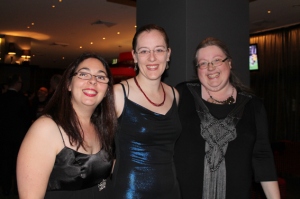
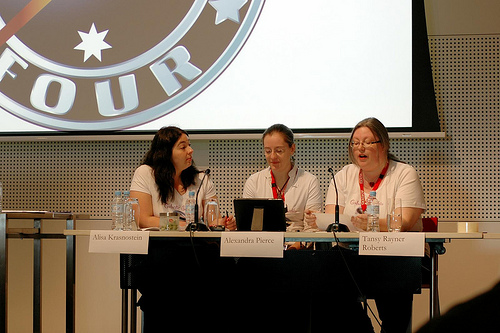

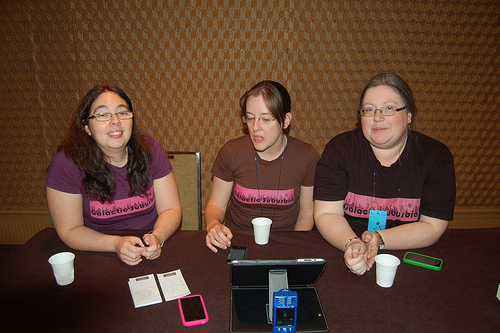





 They’ve had access to a wide range of hobbies and physical activities, from archery to bike riding, martial arts to soccer, digital art to oil painting. There weren’t any frilly dresses or dollies, that’s for sure. They’re mad keen computer games, the pair of them. One’s running her own minecraft server, and the other is working on a graphic novel based on her favourite computer game.
They’ve had access to a wide range of hobbies and physical activities, from archery to bike riding, martial arts to soccer, digital art to oil painting. There weren’t any frilly dresses or dollies, that’s for sure. They’re mad keen computer games, the pair of them. One’s running her own minecraft server, and the other is working on a graphic novel based on her favourite computer game.











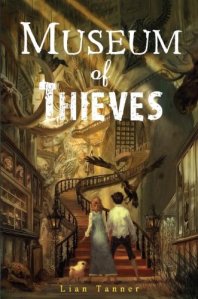



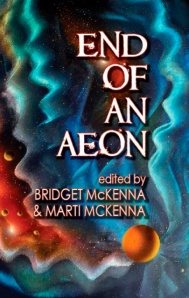


![Sebold-BabylonSteel-PhoneboothCard_thumb[1]](http://writersagainstobscurity.files.wordpress.com/2012/02/sebold-babylonsteel-phoneboothcard_thumb1.jpg?w=192)

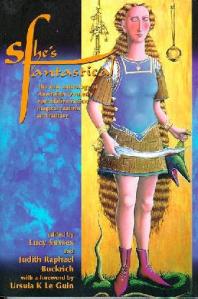



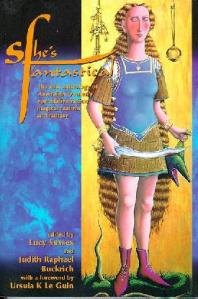





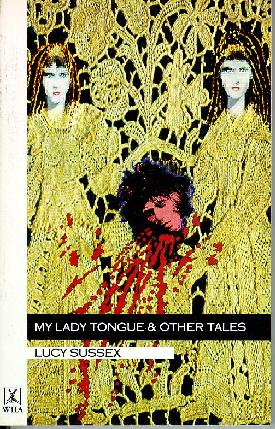
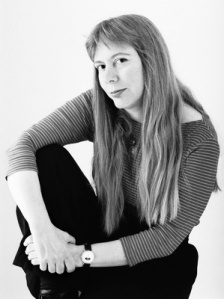
Meet Nalini Haynes, Editor of Dark Matter ‘Zine…
I have been featuring fantastic female fantasy authors (see disclaimer) but this has morphed into interesting people in the speculative fiction world. Today I’ve invited the talented Nalini Haynes editor of Dark Matter E-zine to drop by.
The production of fanzines and magazines by dedicated fans of the speculative fiction genre is an old and proud tradition. Back when the ‘zines were produced on paper smelling of spirits and printed in faded purple ink from the roneo machine, editors compiled articles, interviews, reviews and stories which examined and celebrated the genre. And they are still doing this today, only now they don’t have to worry about squeezing their ‘zine into X number of pages and they can include wonderful colour covers. We’ve come a long way from the roneo machine.
I would love to do a PhD in disability in SFF literature, but I haven’t been able to gain entry to a university to do a Masters as a lead in to this program or any other. I was effectively expelled by the University of South Australia because of being disabled after the Human Rights and Equal Opportunities Commission made a finding of disability discrimination against UniSA. In 2007 UniSA offered me $4000 as compensation for being permanently barred from further education and being gagged. This offer was made through HREOC. I was accepted back into UniSA after threatening to expose them on radio, then I was effectively expelled in 2008 after which their lawyer offered me $3086 with the same conditions. Disability access would have cost far less than the compensation I was offered, let alone the lawyer’s fees. I believe this has influenced universities’ handling of my applications for degrees since moving to Melbourne. I would love to undertake a PhD in disability in SFF literature – I’m collecting a list of books to reference – but I don’t hold out much hope of being accepted into a program.
My first memory of science fiction was watching Dr Who from behind my uncle’s chair when I was about 3 years old; it was a UNIT episode in black and white. I’ve loved science fiction and fantasy ever since. I started reading adult SF when I was 10 years old because Mum lent me her SF books when I was bored.
I worked on my high school newspaper. It wasn’t much fun because we had no autonomy, it was more like being given assignments, but I was interested in doing a newsletter.
In 2008 I was selected for the upstART program in the Adelaide Fringe Festival. I supervised my exhibition in the Fringe Factory for a few shifts, during one of which there was an exhibition/activity with zines in the next room. This reminded me of the school newspaper and showed me that zines were around, with a vibrant community.
A few months later we moved to Melbourne. I searched for some kind of connection to science fiction in Melbourne and found the Melbourne Science Fiction Club. I was appointed as editor of Ethel, the club’s zine, for one issue, during which time I discovered the amazing resources and potential of zines. After this, I decided that I didn’t need anyone’s permission to create a zine. I came up with a name then I contacted publishers telling them I was now independent and asking them if they’d continue to support me. I was off and running!
I’m pleased and surprised to have an international following. I try to have a balance between interviewing international and local authors. By promoting the local authors, I hope to share the bounty we have with our sibling geeks across the water, enriching our shared culture.
I’ve agonised over whether to keep DMF entirely positive – like SF Squeecast – or to balance the positive with the negative. Various people have argued from different positions, helping me shape DMF with some balance, including some negative reviews. I have been strongly encouraged to be more negative with a view to helping raise the bar or to ‘really rip into things’. I’m reserved with this because authors spend a huge amount of time writing their books, often while holding down a day job. If I feel the need to write a negative review, I spell out clearly and respectfully the reasons why I don’t like the book. If I feel that the target market will like the book but I’m not the target market, I’ll try to find a reviewer who is the target market. In the meantime, I write a review bearing this in mind.
On a more personal level, I hope to prove to myself and the world that ‘I’m a real boy’, with skills that are viable in the workplace (computer skills, reading, writing, editing etc). People tend to believe if you’re vision impaired then you’re incapable and incompetent. I’m trying to prove that’s not the case. I’m also hoping for an alternate career path to open up. Failing that, I’m keeping myself busy focusing on an area that I enjoy. I’ve never been the stay-at-home type although I did the full-time mum thing for a few years before studying counselling between child-raising, my son’s many operations etc.
Dark Matter is a positive focus for my time and energy, opening up a wonderful world of creativity and opportunity. One day I hope to make this a real (read: paying) job, or get a similar job elsewhere (that pays).
Q: You have a Master in Social Science from the University of South Australia. With a background like that you must be very tempted to write social commentary either in article format, or by using fiction to examine possible futures. What kind of stories do you write?
Recently I wrote a story about the thin veneer of civilisation, the inhumanity of man to man, called ‘Lighting the Way’. This story still needs more work; I was in Kelly Link’s writing class at Continuum (this year’s state and national SF convention) and received great feedback and lots of encouragement from Kelly and the other participants. I haven’t finished the story yet.
Jim Vinton asked me if I’d replace my eyes with cyber implants if it would give me 20/20 vision. My response: if it was proven to work, I would not have a choice because of the nature of definitions of disability; disability access would be closed to me unless I had that surgery. This got me thinking… what if I had that surgery imposed upon me? People don’t understand how I see: I perceive the world and cope better than I should be able to with my level of vision due to this being a life-long condition. No-one would have any understanding of the changes that this surgery could cause. I have studied psychology: when a limb is amputated, the brain structure changes, the area of the brain dedicated to that limb can be reassigned. What if I had this surgery and the reverse happened? What possibilities would open up to me? What are the potential ramifications? I have the entire story mapped out in my head in the style of ‘He says, She says’ the awesome ABC drama, I just haven’t put it to paper.
Back when the French were testing nuclear devices in the Pacific I wrote a short story about a woman who was eating fish regularly to ensure her baby would be healthy but…
I entered a public speaking competition where speakers were supposed to argue intelligently and emotionally about any topic of their choice. I talked passionately about genocide and prejudice, relating the Hutus and Tutsis to my Irish grandmother’s hatred of Catholics…
So yes, you’re spot on. I’m passionate about people and the human condition. I think good storytelling relates to us here and now in some way, whether it’s as role models, teaching, challenging ideas, exploring ethics and philosophy. Science fiction and fantasy is about people.
Q: In Dark Matter #9 you dedicated 25 pages to Gender in Publishing. You say: ‘If Jonathan Franzen writes a book about family it’s described as ‘a book about America’, whereas if a woman writes a book about family, it’s described as ‘chic lit’.’ You’ve promoted the Australian Women Writers’ 2012 Challenge. You’ve included interviews from male and female writers on the topic. The whole reason I started interviewing female fantasy writers was because US and UK interviewers seemed surprised to discover that I wrote fantasy. Have you had many responses to Dark Matter #9 yet, or is it too soon?
I haven’t had many responses to DMF9. This is the only letter that addresses gender parity or the AWW in any way, from a guy who isn’t really a fan of parity but is a fan of Sean McMullen. Between the lack of articles and the lack of letters, I am sad to say that issue 9 may stand alone in DMF’s attempt to tackle this issue.
Q: On the Dark Matter site there is a page dedicated to audio interviews. When you interviewed me at Sisters in Crime, you recorded us chatting, and later transcribed the interview and printed. Now this interview and others are up on the audio interview page. As an interviewer, what’s the difference between doing an interview that will be listened to as opposed to an interview that is transcribed and read?
HUGE. ENORMOUS. TERRIFYING.
Oh, you want specifics?
An interview that will be transcribed and read can be much more casual. There doesn’t need to be a formal introduction at the beginning, so we can meet or chat on the phone and just casually get into the interview. An interview that is recorded for podcasting needs a formal beginning, an introduction to the author. I’m still getting my head around this. Recently I started interviews by just saying hello and thanks to the author I’m speaking to, but I think this needs to be expanded to a brief toast-master-style introduction. I’m also thinking theme music to lead in to the interview and close would be good, as well as audible credits like with other podcasts.
Sound quality is an issue when putting interviews up as a podcast. I was fairly casual when I interviewed you, putting my Dictaphone on the table so we could both be heard. This is detrimental to audio-pickup, so I’ve started using the Dictaphone microphone. This gives far superior sound for the interviewee but means anyone else is too quiet. Mikey, the amazing audio guy at NatCon2012, suggested I record my questions separately and edit them in so there isn’t a problem with interview questions being too quiet in contrast. This will take longer and require more editing, but it’s do-able, it’s much cheaper than buying good recording equipment and it’s easier than lugging good recording equipment around. The downside is that joint interviews won’t work – unless I get 2 dictaphones and do more editing…
More on sound quality: I’ve interviewed people in some interesting places like coffee shops and outside the Spiegel tent. Background noise can be a problem as well as interruptions. Some interviews’ sound quality is so poor they cannot be put online, I’ve struggled to interpret what was said when transcribing them. The other day I interviewed Yunyu for the second time over Skype and someone was talking in the background. Background noise issues are simply unavoidable unless I get access to a professional recording studio, which is not in the foreseeable future. I do the best I can with what I have and hope for the best.
In a transcribed interview it’s ok to go off-track, lose focus, or for people to say things that need to be edited out, like the classic, ‘Oh, wait, my publicist wants to release that information later, can we edit that out?’ In a recorded interview it’s important to stay on topic, to try not to ‘um’ and ‘ah’, and to keep things moving. Also to turn off mobile phones…
From all the above, you probably think writing up interviews is easier, but really it’s not. An hour interview can take 6 hours to write up effectively, more if the sound quality is poor or the person talks really quickly. That’s before editing, proof reading, sending it to the interviewee for proofing, checking and making changes when it comes back… It’s a huge amount of work. I love the actual interviewing part, it’s fascinating listening to people’s stories, but I am over some of the other aspects of the work. Seriously.
Q: Your cover Girl Torque (Dark Matter 3) was nominated for the Chronos Award. Do you also have a background in illustrating and which artists have inspired you?
Mum studied at the Tasmanian School of Art when I was a young adult. I fell in love with art school then, but the pragmatic side of me – the part that never wanted to go hungry again – wanted a real, paying job. That coupled with a desire to save the world resulted in me qualifying as a counsellor. As I finished counselling studies I rewarded myself by beginning a Bachelor of Visual Arts degree as a counterpoint to counselling people and then as a substitute for working after losing my job. I completed over a third of this degree at the University of South Australia with a distinction average due to working my butt off, but was effectively expelled for being disabled, unable to study theory or complete computer-oriented classes like Digital Art without disability access.
I’ve been in a few art exhibitions – selected and otherwise – and I was selected for the Adelaide Fringe Festival’s upstART program, an arts mentoring program for emerging artists. I won the Dawn Slade-Faull Award in 2008.
Girl Torque and the cover for Dark Matter issue 1 are about the only artworks I’ve completed since moving to Melbourne, apart from photographical works.
Artists who have influenced me would largely be friends of the family as I grew up, friends while Mum was at art school and lecturers at art school like Mark Kimber, Deborah Pauwee and Aurelia Carbone to name but three [I did mention I love photography J]. Andrew Hall was my painting mentor for the upstART program but I was using acrylics. I think I need to return to gouache, I find acrylics too heavy and I’m allergic to oils. Trina was my lecturer for drawing. I loved life drawing and Trina said that perhaps my poor vision was a blessing in disguise as I couldn’t see the finer detail that distracted others. I have contrast vision ‘within normal parameters’ as well, so that helps with shading and tonal qualities. I haven’t explored the world of SFF art much as I wasn’t really aware of fandom until after I moved to Melbourne, by which time I’d had the stuffing kicked out of me. Also there is a bias against SFF art as ‘illustration’ (read: not real art) in art circles.
Being nominated for the Chronos Award for my painting was a huge honour and complete surprise. I did my impersonation of a fish, opening and c losing my mouth, while I read the announcement page about three times, checked the url and so forth, until gradually it sank in that yes, I’d really been nominated for my artwork. I feel really self-conscious but also really encouraged by this nomination; I feel it’s a vote of confidence from others, encouraging me to take up paintbrush, charcoal and pastels once more. I should probably also put some of my fan art on the webz, like my charcoal drawing of Chianna that is sticky-taped to a wardrobe door in the [laughingly titled] studio [aka third bedroom with an east-facing window L]. Friends came over not so long ago and were given a tour of our bookshelves. I think they were more interested in the artwork in that room than the books on those particular shelves.
losing my mouth, while I read the announcement page about three times, checked the url and so forth, until gradually it sank in that yes, I’d really been nominated for my artwork. I feel really self-conscious but also really encouraged by this nomination; I feel it’s a vote of confidence from others, encouraging me to take up paintbrush, charcoal and pastels once more. I should probably also put some of my fan art on the webz, like my charcoal drawing of Chianna that is sticky-taped to a wardrobe door in the [laughingly titled] studio [aka third bedroom with an east-facing window L]. Friends came over not so long ago and were given a tour of our bookshelves. I think they were more interested in the artwork in that room than the books on those particular shelves. 
Q: I was prompted to start this series of interviews because there seems to be a perception in the US and the UK that fantasy is a bit of a boy’s club. Do you think there’s a difference in the way males and females write fantasy?
Perceptions are that there is a difference between the way males and females write fantasy, but I grew up thinking Ursula le Guin was a guy. You could have knocked me over with a feather when I discovered Andre Norton’s Witchworld was written by a woman. I wish someone told me these authors were women when I first read their novels in primary school and high school respectively; I thought being published was effectively barred to women.
I think the stereotypical difference is that men write ‘hard fantasy’ (think A Song of Ice and Fire) while women write about relationships, often with a focus on romance, which has traditionally been looked down upon as soft fantasy.
Q: Following on from that, does the gender of the writer change your expectations when you pick up their book?
In contrast, the Wall of Night series by Helen Lowe has a variety of point of view characters, regardless of gender they come alive on the page. Relationships are important, sex is more than just scratching an itch and yet the act of sex does not make a couple. The first novel in this trilogy, Heir of Night, just won the Morningstar award, so instead of me spoiling the story read it yourself
I’m reading a lot these days, so these differences are good. I try to vary my reading diet: Australian, overseas, serious, comedy, SF and fantasy… A change is as good as a holiday they say, and it certainly helps to re-energise me when I’m feeling a little burnt out.
Q: And here’s the fun question. If you could book a trip on a time machine, where and when would you go, and why?
This is the wrong question. The question should be: what is your preferred time machine and with whom would you travel? The answer: a blue police box. Christopher Eccelston.
Dark Matter’s website
Follow Nalini on Twitter
Catch up with Dark Matter on Facebook
Catch up with the other blog on DMF’s website: Nalini’s ‘life’ blog
Catch up with Nalini on Google+
Interested in Fanzines? Search here at E-Fanzines
Leave a Comment
Filed under Australian Artists, Australian Writers, E-Zines, Gender Issues
Tagged as commenting on speculative fiction, Dark Matter Zine, Disability in science fiction, editing, Nalini Haynes, Nourish the Writer